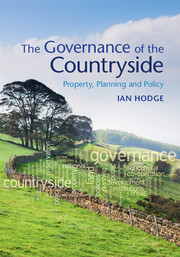Book contents
- Frontmatter
- Contents
- Preface
- Acknowledgements
- List of abbreviations
- Part I Introduction
- Part II Historical models
- Part III Governance under sectoral policies
- 6 Agricultural policies, farming and the environment
- 7 Land, development and planning
- 8 Protected Areas: the example of National Parks
- 9 Wildlife conservation: National Nature Reserves, Sites of Special Scientific Interest and Large-scale Conservation Areas
- 10 Public rights of way and access to the countryside
- 11 The control of agricultural pollution
- 12 The development of agri-environment policy
- Part IV Alternative approaches to governance
- Part V Conclusions
- References
- Index
9 - Wildlife conservation: National Nature Reserves, Sites of Special Scientific Interest and Large-scale Conservation Areas
from Part III - Governance under sectoral policies
Published online by Cambridge University Press: 05 February 2016
- Frontmatter
- Contents
- Preface
- Acknowledgements
- List of abbreviations
- Part I Introduction
- Part II Historical models
- Part III Governance under sectoral policies
- 6 Agricultural policies, farming and the environment
- 7 Land, development and planning
- 8 Protected Areas: the example of National Parks
- 9 Wildlife conservation: National Nature Reserves, Sites of Special Scientific Interest and Large-scale Conservation Areas
- 10 Public rights of way and access to the countryside
- 11 The control of agricultural pollution
- 12 The development of agri-environment policy
- Part IV Alternative approaches to governance
- Part V Conclusions
- References
- Index
Summary
A land ethic, then, reflects the existence of an ecological conscience, and this in turn reflects a conviction of individual responsibility for the health of the land.
Aldo Leopold. A Sand County Almanac and Sketches Here and There. Oxford University Press, New York and Oxford, p. 221. First published 1949. Commemorative edition first issued as an Oxford University Press paperback, 1989And we will make sure that gold plating of EU rules on things like Habitats aren't placing ridiculous costs on British businesses.
Autumn Forecast Statement by the Chancellor of the Exchequer, Rt Hon George Osborne, MP. 29 November 2011While nature conservation values in the countryside are often a product of human land uses and agricultural systems, as we have seen, changes to those systems often threaten valued habitats and species. Land-use intensification and the modernisation of agriculture can have damaging consequences for wildlife. While some types of biodiversity are of direct benefit to the landholder, such as game for shooting, most types have public good characteristics and offer no direct return to the owner or occupier. A key issue then is the extent to which the actions of landholders should be influenced by the state in order to protect public biodiversity values. This chapter looks at progress in the conservation of biodiversity, initially through the creation of protected nature reserves, through the protection of biodiversity on privately owned land and more recently through Large-scale Conservation initiatives. The development of policy has challenged the character of private property and we can see how an initial voluntary approach subsequently led to a realignment of private property rights. This has reflected a shift in public expectations of what it is reasonable to expect from private landowners. However, the limitations on what has been achieved have led to a further change, towards a re-territorialisation of conservation through large-scale initiatives that require cooperative actions amongst multiple landholders. This demands new forms of partnership and approaches to policy. The effectiveness of this approach on the ground has yet to be demonstrated.
Nature conservation in the UK is implemented in the context of commitments at a global level and of legislation originating in the European Union. The UK is a party to the international Convention on Biodiversity, under which it has signed up to a number of targets established in 2010, …
- Type
- Chapter
- Information
- The Governance of the CountrysideProperty, Planning and Policy, pp. 181 - 198Publisher: Cambridge University PressPrint publication year: 2016



